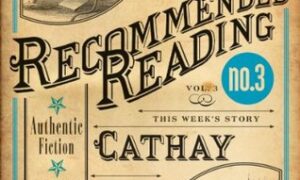 The Lost Child by Caryl Phillips
The Lost Child by Caryl Phillips
My rating: 3/5 cats



i was so excited to read this book. i will read any book that uses Wuthering Heights as its jumping-off point, and since i have been meaning to read caryl phillips for a long time this seemed to be a perfect opportunity. but if you are like me, and reading this for the WH bits, don’t expect this to scratch that itch. yes, there are a couple of chapters that imagine the early life and “rescue” of heathcliff by mr. earnshaw, and it ends with heathcliff’s arrival on the moors where the great tragedy of Wuthering Heights will begin, and there is a chapter or two about the brontës, but the bulk of the story is about an english woman named monica in the 1960’s, making her family proud by winning a place at oxford against all expectations and then throwing it all away by dropping out to marry julian – an older graduate student from a never-named caribbean island. her decision estranges her from her family, and her story is of the disappointments and tragedies that she and her two children endure when her marriage doesn’t pan out.
the parallels between WH and monica’s stories are not numerous. julian and monica’s relationship has none of the wild passion of catherine and heathcliff, and while neither of them are sympathetic characters, their shortcomings are pedestrian compared to the gothic rages of catherine and heathcliff. catherine is headstrong while monica is fragile and defeated – both are self-destructive and both make bad decisions in love, but monica’s descent from brilliant student to frazzled single mother is bland in comparison. catherine would never fret about what to wear to a club.
the story is largely told from the perspective of monica’s eldest son ben. like heathcliff, he is biracial in a sea of white faces, and even though he was born english, he is still marginalized and considered an outsider. like heathcliff, the moors will feature in his life, but with none of their omnipresent oppressiveness that characterizes Wuthering Heights. like heathcliff, he is sent to live with a foster family, but there is no catherine for him, and no trace of the inner darkness that pretty much defines heathcliff.
phillips’ writing is beautiful, and his story packs an emotional wallop, but no matter how you frame it, this isn’t really a satisfying companion story to WH. he has taken Wuthering Heights and removed its central focus – the romance, and chosen to linger over its less-developed ideas of colonialism, racism, outsider status, and the way a family can shatter. which are definitely present in Wuthering Heights as motivating factors to its tragedy, but they’re not the salient themes, and WH wouldn’t be my first thought if presented with those words and asked to name the book.
there are small instances of overlap between monica and heathcliff’s story – location, madness, isolation, loneliness, poverty, sexual abuse; but much of that is overlap with phillips’ imagined origin story of heathcliff, not with what is actually in the source material. (i’ll give you isolation, loneliness and madness, but the madness in WH is very specific and not the clinical mental illness of this novel.)
the tragic failures here are mainly failures of society; the way the system fails children after their parents fail them, whereas the drama in WH is enabled by the absence of society – everything happens in this seemingly vast expanse of moors but within a much smaller emotional bell jar in which a hurricane rages. had catherine been exposed to society, and like, met more dudes, things may have turned out differently. the isolation of WH is a physical isolation; in this novel, isolation is an abstraction of no one being willing to help these suffering characters. they are both bleak and devastating stories, but it’s not always easy to understand their connection.
phillips takes the subtextual assumption that heathcliff was earnshaw’s natural son (so take THAT, guy who was arguing with me on my The House of Dead Maids thread) and runs with it, portraying heathcliff’s squalid surroundings and his mother’s decline as the result of earnshaw’s misguided good intentions. the detail of why he didn’t allow them to go back home was one of those perfect literary moments – a decision made in shortsighted kindness that only invites tragedy. a lovely little heartpunch.
and monica’s decline is also heartbreaking, if less inevitable. we don’t get enough insight into her thinking to really understand how her story turned out the way it did. the beginning of her story is meticulously described – her squandered intellectual opportunities and her pride preventing her from turning to her family after her father disowned her (oh, and HIS story – wow, that was another heartpunch and probably my favorite part of this book), her struggle to raise her two sons on a librarian’s salary, and her search to find a place to feel like she belonged and she mattered. and the end of her story is also made explicit – the series of events that occurred to lead her to … the end of her storyline. but there’s this whole frustratingly muddy middle part where you can see the shine of point a and the tarnish of point b, but the gradation of a to b is unclear.
ultimately, the competing narratives never came together for me, and their supposed connections were a bit of a stretch, but i think his writing is gorgeous, and i definitely want to read something else by him; something unrelated to a novel i have such strong feelings about.
one more thing, and this is spoiler-land, so beware: View Spoiler »







